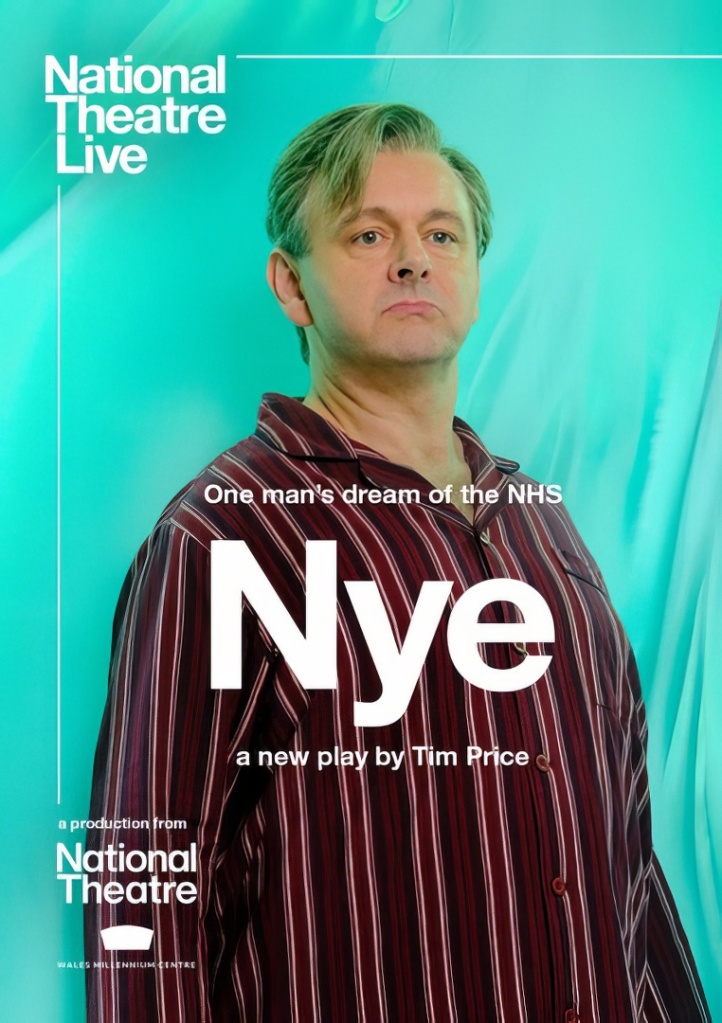
NT LIVE: Nye
Written by Tim Price
Directed by Rufus Norris
Starring Michael Sheen
Live stage performance, filed by the National Theatre of Great Britain
In cinemas May 24
Review by Barry Healy
Aneurin “Nye” Bevan is largely unknown in Australia, but in Britain his is a name to conjure with. He will be forever connected to the epic, 1948 struggle to create the National Health Service (NHS), which was a social reform par excellence.
This outstanding theatrical performance, which comes straight from the stage of the London performance, starts at the end, with Bevan dying of stomach cancer in 1960. His cancer was probably a result of his eight years as a young man in the coal pits of Southern Wales.
Using techniques reminiscent of Dennis Potter’s The Singing Detective, Bevan, under the effects of pain-killing morphine starts to hallucinate his life story (there is even some singing and dancing). Some of the script is taken directly from Bevan’s immensely popular 1951 book, In Place of Fear.
So, the audience is taken through a delirious, non-sequential series of events ranging from Bevan’s early schooling, including a kids’ rebellion against caning, his development as a union and community leader, through his forceful parliamentary career in which he and Churchill waged rhetorical class war against each other and finally his triumph in overcoming the British Medical Association’s opposition to the NHS.
The current British Tory government is doing all it can to destroy that legacy now and the Starmer Labour leadership cannot be trusted to defend it.
Radical back bencher to radical minister
Initially, Bevan spent many years as a left-wing back bencher. Known for his association with the Communist Party he was briefly expelled from the Labour Party for his radicalism. Today his brand of militancy has been largely squashed in the British Labour Party and has been missing from the Australian Labor Party for decades.
At the time Bevan became Health minister in 1945, people in working class districts died early from preventable and treatable illness. It was common for working class Britons to agonisingly undergo such procedures as the setting of broken bones without anaesthesia. Families would have to choose between buying necessary medicines for their children and putting food on the table.
The income-determined access to health care amounted to a class-based apartheid.
While campaigning in the landslide Labour electoral victory in 1945 Bevan said: “We have been the dreamers, we have been the sufferers, now we are the builders. We enter this campaign at this general election, not merely to get rid of the Tory majority. We want the complete political extinction of the Tory Party, and twenty-five years of Labour Government.”
In the years following, he was central to the construction of the British welfare state.
Bevan was famous for his stirring and cutting eloquence. His pithy sentences ring through to today. Unfortunately, in the play’s rush to tell his 62-year life story in a couple of hours we miss some of his most famous oratory.
It’s a pity we don’t hear him addressing a 1948 Labour Party rally, saying: “No attempt at ethical or social seduction can eradicate from my heart a deep burning hatred for the Tory party. So far as I am concerned they are lower than vermin. They condemned millions of first-class people to semi-starvation.”
Churchill, leading the post-WWII Tories in Opposition articulated the ruling class hatred of Bevan, referring to him as “the minister for disease”. He also said: “He will be just as great a curse to this country in peace as he was a squalid nuisance in time of war.”
However, Churchill also said: “He is one of the few people I would sit still and listen to.”
Private life
In the play the audience discovers aspects of Bevan’s private life such as his open marriage with fellow left-wing parliamentarian Jennie Lee. Both were committed to socialism. However, we mostly hear of how Lee sacrificed her career to tend to Bevan.
There is considerable time devoted to Bevan’s father’s death from the hideous miners’ disease, Black Lung (pneumoconiosis). His sister is shown berating him about emotionally avoiding facing up to his father’s condition.
The time spent of those points is at the expense of showing the breadth of Bevan’s radical commitment. Alongside Jennie Lee, he demonstrated exemplary solidarity with the Republicans in the Spanish Civil War. Earlier, he played a leading role in the 1926 British General Strike, one of the high points of British class struggle history.
Also undeveloped is Jennie Lee’s independent life. She was a considerable socialist firebrand in her own right. As minister for the Arts under Harold Wilson she established the Open University and the expansion of Arts Council of Great Britain, both major egalitarian achievements.
Masterful theatre
Nye most certainly succeeds as a masterful piece of theatre, showcasing superb acting and creative staging. However, the choices made in squeezing the enormity of Aneurin Bevan’s life into a brief time lessen the radical man.
Nevertheless, the NHS, Bevan’s crowning achievement, can never be diminished. Within its first ten years of operation infant mortality in Britain fell by 50 per cent, an astonishing triumph and a measure of his life of service to the working class.
And Bevan himself predicted the class struggle required to maintain the NHS: “It will last as long as there are folk left with the faith to fight for it.”
+++
